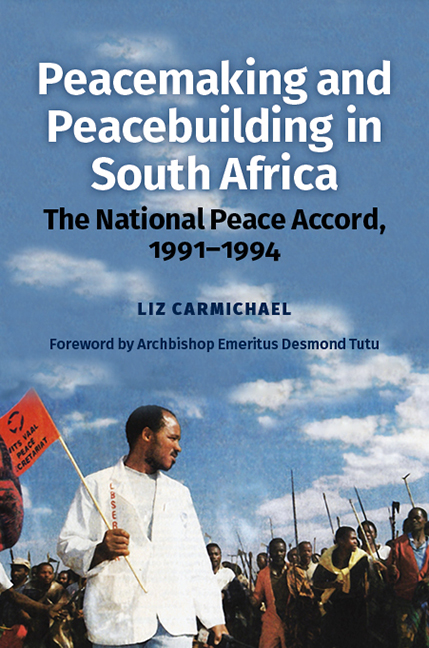Book contents
- Frontmatter
- Dedication
- Contents
- List of Illustrations
- List of Abbreviations
- Glossary
- Acknowledgements
- Note on Nomenclature
- Transition Timeline
- Foreword
- Introduction
- Part One Peacemaking, Peacebuilding, and the South African Conflict
- Part Two Peacemaking
- Part Three Peacebuilding
- Conclusion: Impact and Unfinished Business
- Bibliography
- Index
20 - A Role in Future Peacebuilding?
Published online by Cambridge University Press: 08 October 2022
- Frontmatter
- Dedication
- Contents
- List of Illustrations
- List of Abbreviations
- Glossary
- Acknowledgements
- Note on Nomenclature
- Transition Timeline
- Foreword
- Introduction
- Part One Peacemaking, Peacebuilding, and the South African Conflict
- Part Two Peacemaking
- Part Three Peacebuilding
- Conclusion: Impact and Unfinished Business
- Bibliography
- Index
Summary
Introduction
After the April 1994 election opinion was split between those who felt the peace structures had helped deliver the desired multiparty democracy and should now close, and those who believed far more peacebuilding remained to be done, in which the structures had important roles to play.
President Mandela opened his first Parliament in May 1994, saying: ‘We have also directed that all relevant ministries should engage the structures set up in terms of the National Peace Accord so that these can be invigorated to pursue their noble mission in the context of the changed circumstances in our country.’ Those believing the structures should continue intact seized upon the message of invigoration; those against seized on ‘changed circumstances’. All agreed, at least in theory, that considerable expertise had been built up, which should somehow be used – but how, was unclear. The peace structures had a mention in passing in the ANC's RDP manifesto, as something to be built upon; but no party had thought to give the structures a clear future role.
The structures were at their peak: 11 regions, some 263 LPCs, 83 offices and a total of 414 staff (357 seconded or on short contracts, 57 temporary). There was one major complication, and it was financial. The structures had exceeded their budget for the current financial year, April 1994 to March 1995. It totalled R65,706 million, of which R34,129 million supported the NPS and the regional and local structures. Election monitoring had brought an overspend of R18.5 million (roughly, car rental R11 million, setting up radio communications R4 million, paying monitors R3.5 million), and a new un-budgeted expense was envisaged: the outgoing Minister of Home Affairs, Danie Schutte, had approved ‘token’ attendance allowances for committee members, estimated at an extra R15,840 million. All told, the NPS needed an additional R35 million to cover all these needs for the current financial year. Otherwise, funds would run out in September. Most staff were on contracts requiring two months’ notice, so the issue was urgent.
- Type
- Chapter
- Information
- Peacemaking and Peacebuilding in South AfricaThe National Peace Accord, 1991-1994, pp. 434 - 450Publisher: Boydell & BrewerPrint publication year: 2022



